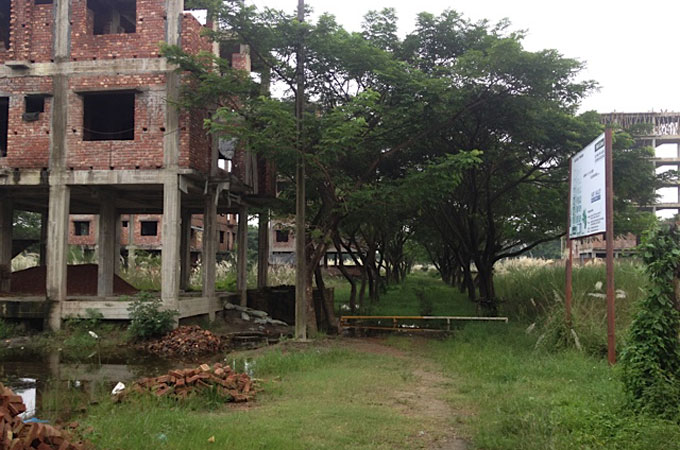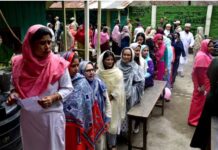Rights groups allege rise in number of opposition leaders being abducted by state agencies amid lack of accountability.
Nearly a year after Sajedul Islam Sumon, a local leader of opposition Bangladesh Nationalist Party, was forcibly taken away by black uniformed men from the Bushandara area of the capital, Dhaka, his whereabouts are still unknown.
Eye-witnesses present at the scene said that armed men, some wearing the uniforms of the paramilitary force, Rapid Action Battallion, hooded Sumon along with six other men, including his cousin Tanvir, put them into a vehicle and drove off.
“Within half an hour, our mother and various members of the family drove to the office of RAB-1 in Uttara,” Sanjida, Sumon’s younger sister, told Al Jazeera.
“But a duty officer denied that RAB was involved in any such incident, and said that he had no information about where Sumon might be.”
None of the six men have been seen since.
Sumon’s family members received a similar response when they went to the police station – where the family alleges they weren’t allowed to file a proper written complaint.
“The police said ‘you can only write down that Sumon had left home, that he had not come back and that he is missing’. They did not want us to write what actually happened, and anything about RAB,” Sanjida said.
RAB, an elite counter-terrorism force is led by senior military officers but also comprises other law enforcement officers and has 14 separate battalions throughout the country.
National outcry
In almost two years, the local human rights organisation, Odhikar has recorded 75 people in Bangladesh abducted by different law enforcement agencies.
Twenty eight of those who were abducted returned alive, but 12 have been found dead and another 35 people remain missing. In 61 of these cases, eye-witnesses identified men from either the Rapid Action Batallion or the detective branch of the police as responsible for the kidnapping.
According to human rights organisation, Ain-o-Salish Kendra, the numbers of alleged disappearances are more than twice that number in the same period.
In April this year, there was a national outcry over the discovery of the bodies of seven men who were strangled and blindfolded and thrown into the Shitalakkhya river, four days after they were kidnapped by men who were identified as being from the RAB.
Following an unusual intervention by the High Court, nine RAB officers are now in detention and a police investigation is ongoing.
“It is highly unusual for the police or any other investigative authority to take any action in relation to these enforced disappearances,” said Adil Rehman, the Secretary of Odhikar.
Many of the men subjected to enforced disappearances were actively involved in one of the opposition political parties.
Sumon was a key leader of the BNP in the Shaheen Bagh area of Dhaka, and his sister Sanjida believes that this is why he was abducted.
“At that time, in December the elections were due to take place sometime in January, and the opposition were organising protests, and Sumon was known as a good political organiser in his area,” she said.
The family has been at the forefront of publicising their situation and that of other families after getting no clue about Sumon’s location.
Sanjida is helping her mother organise a new group called ‘Mother’s call’ (Mayer Dak), bringing together mothers of the men who have been kidnapped by state agencies.
Ruhul Amin Chowdhury, a 65-year-old retired teacher, has also not heard from his son Adnan Chowdhury after he was taken away for questioning by law enforcement officials.
Adnan was picked up in the middle of night from his house in Shahen Bagh, within a mile of the prime minister’s office, hours after Sumon’s abduction on December 5, 2013.
A number of men came into the house, some of them armed, and some of them wearing a RAB uniform. “They asked where was the bedroom of Adnan, my son. I showed them where it was, and then they told me to sit in my room,” Chowdhury said.
“They searched every room of the very small, tin-shedded, house, and then they said, ‘We are taking Adnan away and we will return him next morning.'”
Like Sumon, Adnan was also involved in BNP politics as part of the volunteer front of the party.
When Adnan did not return in the morning, his father became anxious. He said that he went to various different law enforcement offices in Dhaka including RAB, the detective branch and the ordinary police station. But no one could provide any information.
“When no one could give me any information about my son, I became hopeless,” Chowdhury said. “When I have seen my son taken, and other people in the area have seen what happened, how can RAB and others tell such lies? They promised to return my son, and now they have betrayed me.”
Disturbing trend
Adnan, due to leave for Malaysia for higher education, was not the only person in the neighbourhood taken in the early hours of the December 5. Kawser Ahmed, another young BNP supporter was picked up as well.
Both men have not been seen again.
RAB has denied any involvement in these incidents. “No, RAB is not involved at all. People may say that they saw RAB vehicles, but that is not the case. Once we apprehend someone, we hand them over to the police for legal action,” Comander Mufti Mahmud Khan, the Director of RAB’s media and legal wing, told Al Jazeera.
In a report published earlier this month Amnesty International condemned the high level of disappearances in Bangladesh.
“We have also documented a disturbing trend that suggests the security forces are responsible for a continuing pattern of disappearances, even though they deny it. The government has to take a long, hard look at the conduct of its own security forces, and end the almost complete lack of accountability around these cases,” said Abbas Fais, Amnesty International’s Bangladesh Researcher.
“Investigations into enforced disappearances are rare in Bangladesh. The police usually refuse to register complaints, only doing so when the families have obtained a court directive ordering an investigation. Even then, police usually do little to investigate the incident.”
Source: Aljazeera










